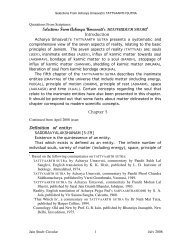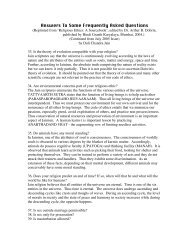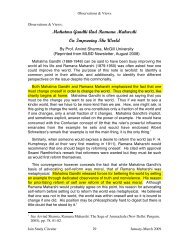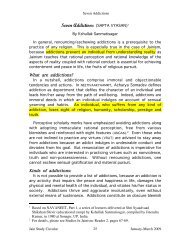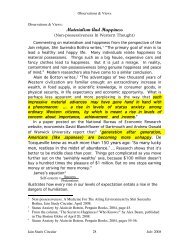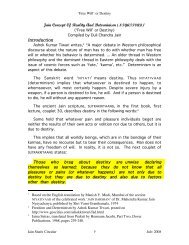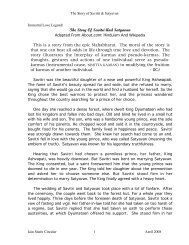Past, Present And Future Of Jainism - The Jain Study Circle
Past, Present And Future Of Jainism - The Jain Study Circle
Past, Present And Future Of Jainism - The Jain Study Circle
Create successful ePaper yourself
Turn your PDF publications into a flip-book with our unique Google optimized e-Paper software.
Religion & Society:<strong>Past</strong>, <strong>Present</strong> <strong>And</strong> <strong>Future</strong> <strong>Of</strong> <strong><strong>Jain</strong>ism</strong>by Duli Chandra <strong>Jain</strong>(Based on a lecture delivered at a Mahaveer Jayanti Celebrationabout 20 years ago)Today, I am not going to play the role of an astrologer - <strong><strong>Jain</strong>ism</strong> doesnot believe in astrology or mysticism. I am not a scholar of history orphilosophy or religion. My ideas have developed through my involvementin the <strong>Jain</strong> <strong>Study</strong> Circular. <strong>The</strong> question that has constantly come to mymind is: Is there anything unique about <strong><strong>Jain</strong>ism</strong> or what is so unique about<strong><strong>Jain</strong>ism</strong>? <strong>The</strong> answer to this question leads us to the views of past,present and future of <strong><strong>Jain</strong>ism</strong>.<strong>The</strong> <strong>Jain</strong> religion is the religion of TEERTHANKARs. Dr. Nemi ChandraJyotishacharya has portrayed TEERTHANKAR as a revolutionary. BhagwaanMahaveer was a revolutionary. Mahaveer saw that the common peoplewere being exploited by the religious establishment of his times. <strong>The</strong>religious leaders, priests and monks of those times propagated ideas andpractices that helped them fulfill their own selfish motives. <strong>The</strong>yprescribed cures for physical and mental ailments. <strong>The</strong>y had prescriptionsfor everyday problems of life - love, marriage, children and so on and soforth. Those remedies involved blind faith, rituals, donations, charity, etc.Bhagwaan Mahaveer said that such practices cannot be part of religion.Dr. A. N. Upadhye writes: "<strong>The</strong>re is no place either for a Deity who shapesthe universe and meddles in its matters, or for a priest invested withmysterious powers to propitiate Him."<strong><strong>Jain</strong>ism</strong> is the religion for scientists. It is the religion for individualswho do not accept anything as faith. It is for men and women who study,experiment, observe, experience, question and then form their own ideas.All of us are born scientists. We observe and experience. We experimentand try to verify our concepts. We gain more knowledge and experiencethrough this scientific process. <strong>The</strong> <strong>Jain</strong> religion encourages us to adoptthe scientific process so that we can improve our concept of life. <strong>The</strong>cardinal principle of the <strong>Jain</strong> religion is rationalism (SAMYAKTVA). It entailsa proper attitude, open-mindedness, rational thinking and meaningfulactions. It tells us to observe the way our parents and grandparents live,study religious books and understand them. Thus we are expected toform our own view of <strong><strong>Jain</strong>ism</strong>. Problems arise when parents do not findtime to help their children find rational answers to certain questions.
<strong>The</strong>re are great minds of the past who are just waiting for us to open thescriptures and enjoy reading them. We should remember that sometimesthe so-called monks and scholars do not give us straight answers becausethere are no answers.Bhagwaan Mahaveer's religion is supposed to be beyond all ritualism.Writing about the Great Head Bathing Ceremony of Bhagwaan Bahubali,the correspondent of Time magazine wrote in 1981, "<strong>The</strong> Great HeadBathing Ceremony brings no absolution from sin. It propitiates no gods. .. . Most important it does not help remove the oppressing cumulativeweight of individual misdeeds known . . . . as karma. . . . While theHindus offered ritual, meditation and devotion to gods, the other tworeligions (<strong><strong>Jain</strong>ism</strong> and Buddhism) taught that karma and reincarnationcould be escaped through the willed elimination of ego and desire." Thisis the fundamental tenet of <strong><strong>Jain</strong>ism</strong>. Problems have come up because wehave ... limited our religion to traditional rituals.<strong>The</strong> above concepts answer the question: How old is <strong><strong>Jain</strong>ism</strong>? <strong><strong>Jain</strong>ism</strong>has no beginning, it was not founded by any individual. <strong><strong>Jain</strong>ism</strong> hasexisted ever since there have been rational, logical, thinking individuals.According to <strong>Jain</strong> belief, our TEERTHANKARs have been reviving thisapproach towards religion. By the same token, <strong><strong>Jain</strong>ism</strong> will continue toexist forever. It is like the absolute truth that exists although nobodymay know it at a given time.Describing the present state of <strong><strong>Jain</strong>ism</strong>, Prof. Shri Krishna Saksenawrites, "<strong><strong>Jain</strong>ism</strong>, like Hinduism, after stagnating for centuries petrifieditself into sheer ritualistic practices. After, the spirit had left, the bodycontinued to be artificially fed by blind adherence to dead formulae." Hecontinues, "Its (<strong><strong>Jain</strong>ism</strong>'s) love extends not only to humanity but to allliving creatures; and, shorn of its handicap of utterly unsuitable rigidity ofits ritualistic observances, the growth of AHIMSA, or the "spirit of <strong><strong>Jain</strong>ism</strong>"should have a great future and a great message indeed for a world todaytorn with growing hostility and uncontrollable violence."What is the present state of <strong><strong>Jain</strong>ism</strong>? A little thought reveals that ourpresent <strong>Jain</strong> establishment is not different from the religious systemagainst which Bhagwaan Mahaveer had started his revolution. What our'gurus' preach and teach is not different from what the priests ofMahaveer's times were doing. Our religious institutions are supposed tobe the embodiments of the principles of the <strong>Jain</strong> religion - principles suchas non-possessiveness (APARIGRAH), sincerity of purpose and so on and soforth. Instead, many of our prestigious institutions organize rituals of allkinds in pursuit of money and materials. Such unscrupulous behavior on
our part makes an adverse impact on our future generation, which is ourhope for the future.When the propriety of our practices is questioned, we give excuseslike:• All religious groups do similar things.• Something is better than nothing.• How can we establish <strong><strong>Jain</strong>ism</strong> without doing this or that?We should not accept that ends justify the means. BhagwaanMahaveer had the knowledge and understanding of human nature. Still hepresented the pristine view of religion. He did not say that we couldmake exceptions to suit the circumstances we are in. <strong>The</strong>refore, weshould go back to the basics of <strong><strong>Jain</strong>ism</strong>. It is imperative that we devise'<strong>Jain</strong>' ways to run our lives and our institutions. We should not be misleadby our preachers and scholars who present <strong><strong>Jain</strong>ism</strong> as a 'parody' of otherreligions and entertain us with childish anecdotes most of which do notmake sense. Religion is the science of living and therefore we should notconfine it into the walls of centers and temples. We should imbibe theprinciples of <strong><strong>Jain</strong>ism</strong> in our daily lives and enrich ourselves.I have high hopes that the next generation will fulfill theirresponsibility of ridding <strong><strong>Jain</strong>ism</strong> of the scourge of hearsay,superstitions, materialism and meaningless rituals. I am hopefulthat they will be able to bring out the true spirit of the <strong>Jain</strong>religion.On this auspicious day of Mahaveer Jayanti, we should make adetermination to establish a <strong>Jain</strong> system, which reflects the beautifulprinciples of the <strong>Jain</strong> religion.



